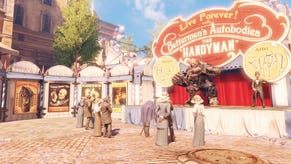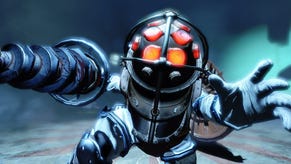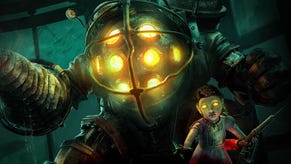BioShock Infinite's Ken Levine: of sounds and pixels
Stace Harman sits down with the man behind BioShock Infinite to get his views on story-telling, companion AI and why he believes that, ultimately, his intentions are irrelevant.
Ken Levine is a man with a lot on his mind. Fortunately for you and me, a not insignificant amount of what is on his mind tends to find its way into the rich output of Irrational Games.
When I sit down with Levine immediately after playing through several hours of Bioshock Infinite, my own mind is whirring. I’m attempting to piece together the myriad clues and talking points I’ve found in the opening hours of the game.
I’m trying to place the references to modern and classic literature, to decipher the eclectic soundtrack choices, to list the nods to the original Bioshock and to digest the commentary on socio-economic beliefs. I’m also wondering about all the things that I’ve undoubtedly missed.
With so much going on, my opening questions for Levine concern how he paces himself and his narrative, so as not to overwhelm the player, and how he decides the best method by which to deliver each narrative reference.
“When you’re writing for the player, you have to be really clear about what it is you’re trying to convey,” Levine explains. “You don’t get to hand them a 'readme' file to help brief them on what you’re doing. So, quite simply, if it's not coming across in the sounds and the pixels of your game, then it's not coming across at all.
“I have this thing in my head of casting. That doesn't mean casting actors for the game; it means ‘I have this story element, now who gets assigned it?’ Does a poster get assigned it? Or an audio-log? Does that character or this character get it?
“I'm getting a little ‘inside baseball’ here, but each of the audio-log tracks and each of the characters has a single story to tell. If you try to overload any of the characters with too many things it gets very confusing. Sometimes you'll have a major character carry more than one story, but generally a character is cast to tell a particular story.”
The dearth of believably living, story-bearing characters in the original Bioshock meant much of its own narrative was delivered through audio-logs. Supplementing these were punchy, visual scenarios depicting the aftermath of Rapture’s explosive decline. By comparison, the early hours of Bioshock Infinite are teeming with life.
With an increased level of narrative detail framed by a large number of potential distractions, more sophisticated techniques are required to draw the player’s attention to items of interest. When explaining how he juggles these considerations, Levine deliberately avoids using examples from Infinite, so as not to spoil any of the surprises.
Instead, he gives a clear example of how best to hold the players attention by using a well-known reference point from the first game.
“I think that the original BioShock helped environments in games because we had a level of detail that people hadn’t really seen before and so, hopefully, BioShock [Infinite] will be able to raise the bar again.”
Levine said, “There's a lot of craft going on under the surface and I've learned some effective techniques over the years. One is to use colour to highlight things and another is to simplify key areas.
“As an example of this, look at Andrew Ryan's office in Bioshock. When you think about it, it's ridiculous. His office is behind a big glass window, for a start, and when you enter that encounter the lights are on in your part of the room and they’re down in his. Then, like in a theatre, the lights go down on your side and up on his. It's completely artificial.
“I'm probably ruining it for everyone here, but his office isn't like a real office at all. It’s really like an old theatre stage set, to focus attention on him and what he's doing. None of that is an accident; we very purposefully build things in a certain way so we can be very confident that people will see things that are important.”
Something that you’ll be seeing a lot of in BioShock Infinite is how capable an AI companion Elizabeth will prove herself to be. Elizabeth has been the subject of interest since she was unveiled and has recently undergone a welcome costume change to complement her increased role as protagonist Booker DeWitt’s partner, not just his vulnerable and over-sexualised charge.
Given the generally poor standard of companion AI in video games, it’s a bold move to have Elizabeth take up such a prominent role here. So, how is Levine and Irrational hoping to progress this much maligned area of design?
“There are evolutions and revolutions. Sometimes games keep up and sometimes they don't and the state of companion AI is testament to that,” Levine acknowledges. “We worked very hard on [Elizabeth].
"Of course, it’s up to the player to decide what they think of her, but we can say that, objectively, she’s certainly more engaged in the world than pretty much any other companion AI. The bar hasn’t been set very high, to be fair; it’s one of those things that once people see [poor AI] in a game, the whole thing becomes harder to accept.”
“I think that the original BioShock helped environments in games because we had a level of detail that people hadn’t really seen before and so, hopefully, BioShock [Infinite] will be able to raise the bar again [for companion AI]. Listen, I raid other games all the time and steal from other games and so I can only assume that if we’re doing our job right then people are doing the same with us.”
“The experience is the experience that you have. That’s all that matters; my intention is irrelevant. I can guarantee that there will be stuff that people see that wasn’t intended, but I’ll also tell you this: I don’t know of a lot of accidents in this game.”
It occurs to me as I speak to Levine that it might be easy to over-analyse what he and Irrational are doing. The likes of System Shock 2 and BioShock set a certain level of expectation for everything else that they do.
This is further compounded by the fact that BioShock Infinite looks to be an even more ambitious game, with several layers of narrative complexity, but it’s one that must also stand-up as a coherent title for those disinterested in its wider exposition.
So, does Levine ever feel that people over-analyse his intentions or perhaps misconstrue them all together? Levine considers this for a little while and I start to wonder if I should rephrase the question.
“Let me tell you something; and this is not necessarily going where you think it is,” he warns gently. “A lot of people wrote their college thesis on BioShock, which was a very nice and a very cool thing. I read a bunch of them and they told me a lot about literary criticism.
"I remember that one was on the nomenclature of the character names in BioShock and about how I’d derived them from all these complicated words and mathematical theories or ancient, obscure, Greek characters.
“Now, of course Andrew Ryan is a semi-anagram of Ayn Rand and I was certainly guilty of that one, but mostly they were just people I knew or names I made up. However, that doesn’t mean that the experience that person had playing the game and thinking about all of those theories isn’t still completely valid because, frankly, who gives a s**t what my intent is?
“It’s all about the experience that the gamer has that’s important. If someone gets some added-value element that I didn’t have to do any work for, that’s great, right? The experience is the experience that you have. That’s all that matters; my intention is irrelevant. I can guarantee that there will be stuff that people see that wasn’t intended, but I’ll also tell you this: I don’t know of a lot of accidents in this game.”
With those words fixed very much at the forefront of my mind, I go back to re-examine some of the sights and sounds of BioShock Infinite’s opening hours; all the while thinking that Ken Levine is a man with a lot on his mind. Fortunately for you and me, a not insignificant amount of it looks to have found its way into Bioshock Infinite.
We’ll get to theorise, debate and experience our own added-value elements of its narrative when BioShock Infinite launches on PC, PS3 and 360 on March 26 2013. An account of my time with the opening hours of Bioshock Infinite will be on the site in the next few days.













